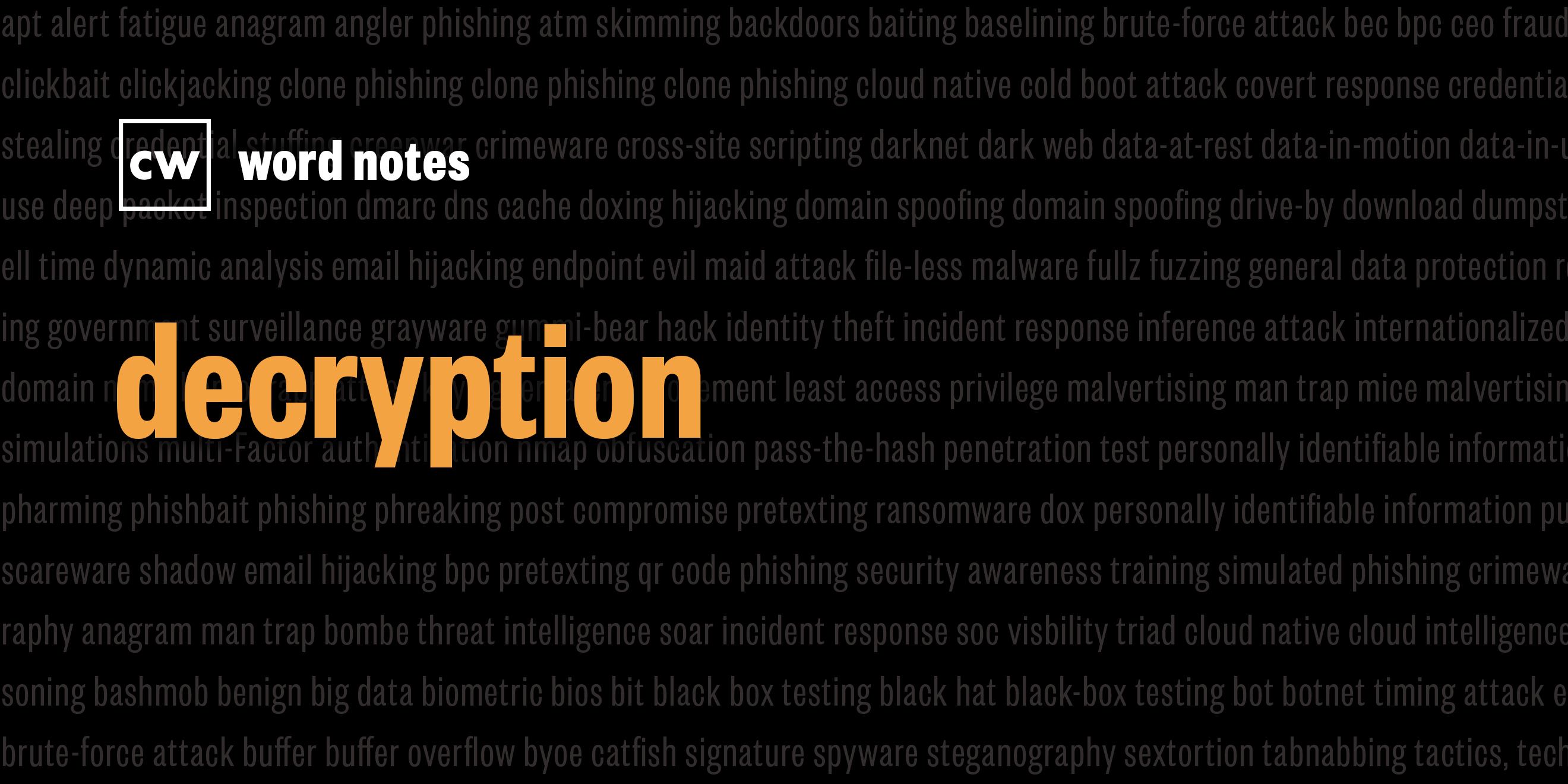
decryption (noun)
Rick Howard: The word is: decryption.
Rick Howard: Spelled: D as in the Dorabella cipher, E as in the Enigma machine, C as in the Choctaw code, talkers, R as in Room 40, Great Britain's first crypto analysis section in World War I, Y is in the Yogtze case, a mysterious unsolved German code spelled Y O G T Z E, P as in the Japanese Purple Code in World War II, T as in Alan Turing, I as an information, O as in one-time pads, and N as in the Navajo code talkers.
Rick Howard: Definition: A process of converting encrypted data into something that a human or computer can understand.
Rick Howard: Example sentence: From "Code Girls" by Liza Mundy: "The Poles broke the Enigma during the 1930s in part thanks to a German who passed schematics and decrypted messages to French intelligence who passed it to them and to a commercial model they obtained."
Rick Howard: Origin and context: Humans have been trying to prevent spies and unwanted recipients from decrypting communications for practically as long as known history. As far back as 600 BC, the ancient Spartans used a device called a scytale to send secret messages during battle so that if the message fell into enemy hands, their opponents wouldn't be able to understand the order of battle.
In modern times, some of the most thrilling decryption stories happened in the early 1900s. There's a story of Elizabeth Smith Friedman who founded from scratch the American code breaking effort before World War I and broke the codes of rumrunners during prohibition, working for the Justice and Treasury Departments, the Customs Bureau, the Coast Guard and other agencies. Incidentally, she designed the codes used by the Office of Strategic Services, the predecessor to the CIA. There's a story of the American effort from the Pentagon and Arlington Hall, led by Elisabeth's husband, William Friedman, to decrypt the Japanese Purple Code during World War II, a code generated by a modified German Enigma machine and used for diplomatic traffic. There's the story of Navy analysts in Hawaii and Washington breaking the Japanese JN-25 Contact Codes that led to the assassination of Admiral Isoroku Yamamoto, the commander of the Imperial Japanese Navy and the winning of the Battle of Midway.
But my favorite story is the work done at Bletchley Park during World War II, where British analysts, mostly women, decrypted messages created by the German Enigma machine that allowed the Allies to know what the Germans were going to do on the battlefield before the German commanders in the field knew.
Rick Howard: Nerd reference: The 2014 movie "The Imitation Game" dramatized the efforts of Alan Turing, my all time favorite computer science hero, and his colleagues decrypting the codes created by the German Enigma machine during World War II. In this scene, the first decryption breakthrough, Turing, played by Benedict Cumberbatch, has an insight that leads to the fall of the entire German encryption system. Turing's nickname for the decryption machine that he and his team built is Christopher. But most people refer to that machine as the Bombe. You'll hear Hugh Alexander played by Matthew Goode and Joan Clarke played by Keira Knightley.
Alan Turing: What if Christopher doesn't have to search through all other settings? What if he only has to search through ones the produce words we already know will be in the message.
Hugh Alexander: Repeated words.
Alan Turing: Predictable words, exactly.
[The Germans] Send out weather reports every day at 6:00 AM. So that's, that's three words we know will be in every 6:00 AM message: weather obviously, and
Hugh Alexander: Heil Bloody Hitler.
Alan Turing: Heil Bloody Hitler. I need a new message. The latest intercept...
That's the only German you need to know to break Enigma.
Rick Howard: With this decryption breakthrough, the Bletchley Park gang probably saved 20 million lives and shortened the war by at least two years.

